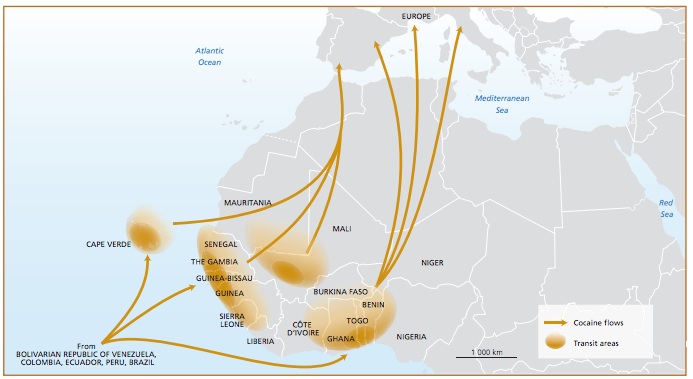A report by the United Nations states that the influence of South American criminal groups in West Africa may be declining as local groups take on more responsibility for moving cocaine shipments.
The report, released February 25, highlights some indications that the overall amount of pure cocaine moving through West Africa has declined. An estimated 18 tons of the drug moved through the region in 2010, compared to 47 tons in 2007, according to United Nations Office on Drugs and Crime (UNODC) figures, which are based in part on cocaine seizures in Europe. Meanwhile, large seizures of cocaine in West Africa are dropping, and fewer couriers originating from the region are being apprehended (see the UNODC's map of cocaine flows, below).
But as the report points out, rather than indicating that cocaine flow overall is dropping, the decline in seizures could merely be a sign that traffickers are developing new routes and new ways of moving the drug. And while South American criminal organizations were once primarily responsible for moving cocaine through the region, packing it in multi-ton shipments, there is evidence that West African groups are playing an increased role in moving smaller shipments on to Europe, the report adds.
The report notes that the average size of cocaine shipments seized from maritime vessels in West Africa is now no more than 175 kilos, a significant drop from the multi-ton cocaine seizures reported in the past. According to the UNODC, the declining role of the South American traffickers could help explain why the average seizure size of cocaine is going down, if West African groups are stepping up and trafficking the drug in smaller, harder to detect quantities.
The UNODC goes on to observe that much of the larger cocaine shipments that move through West Africa originated in Venezuela. The east Venezuelan states of Bolivar and Anzoategui were once considered the primary departure points for cocaine flights going across the Atlantic, along with the western city of Maracaibo and Margarita Island, less than 50 kilometers off the Caribbean coast. According to the UNODC, Venezuela has stated that these regions currently see little cocaine trafficking, and that the majority of cocaine flights currently leave Venezuela for Honduras and Haiti rather than West Africa.
The UNODC theorizes that if trafficking between Venezuela and West Africa has indeed dropped, it is possible that smaller cocaine shipments from Brazil now make up the majority of the illicit drug shipments arriving in West Africa. Much of this trade is now allegedly controlled by elements of the large Nigerian community in Sao Paulo. Brazilian officials told the UNODC that Nigerians are believed to be responsible for moving some 30 percent of the cocaine shipments that leave Brazil's largest port, while some 90 percent of the drug mules arrested at Sao Paulo's international airport said that they were supplied by Nigerian groups.
InSight Crime Analysis
As the UNODC points out, drug trafficking organizations based in South America are still responsible for transporting the majority of cocaine shipments that reach Europe. Only one fifth of drug flights to Europe originate in West Africa; the remainder depart from Latin America and the Caribbean.
Nevertheless, if West African groups have indeed moved from primarily performing logistical duties for South American traffickers to actually controlling cocaine shipments themselves, this would have important implications for South America's drug cartels, and for West Africa. In such a scenario, the South American criminal organizations would likely see reduced profits, while West African traffickers could pose a greater threat to the stability of their region.
Much of the UNDOC report details trends that have been observed for some time. In 2011, the UNODC head said that local traffickers in West Africa were playing an increasingly significant role in the business, pushing out the South American groups. The past few years has also seen multiple cases of mules arrested in Brazil for attempting to smuggle cocaine to Africa.
